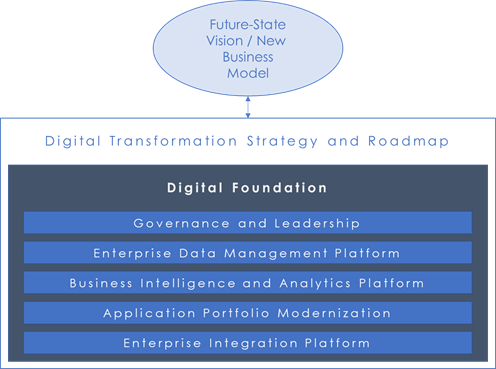Enterprises are challenged by the development and execution of a successful Digital Transformation Strategy and Roadmap. Some even question the need for it; but by building a Digital Foundation, organizations can minimize the confusion around digital transformation and help set the journey on the right path.
This Digital Foundation is the building blocks that will enable the advancement of a digital transformation strategy. Key focus areas are on governance and leadership, enterprise data management, business intelligence and analytics, applications portfolio modernization and enterprise integration. Ultimately, a Digital Foundation facilitates seamless integration of new digital capabilities and solutions into the business.
INTRODUCTION
Digital transformation has been discussed profusely within recent times – and today it is widely accepted that companies must act swiftly to stay relevant in the Digital Economy. In fact, several businesses around the world have already embarked on their journey. The bad news however is that many are struggling to overcome typical roadblocks – one of the main ones being the lack of a clear and actionable digital transformation strategy to guide the transformation.
The question then, is what constitutes a successful digital transformation strategy. The answer is not simple in most cases, and it certainly varies across business environments. There are however fundamental components that can set the transformation on the right path – referring here to a ‘Digital Foundation’, which is essentially the building blocks that will enable the advancement of the digital transformation strategy.
DIGITAL FOUNDATION BUILDING BLOCKS

- Governance and Leadership
Having an effective governance model is crucial to digital transformation success. Without that, too much chaos and conflict could be the cause of demise. Effective governance therefore entails determining who are the right people to involve, and how and when should they be involved. Also, what guidelines and processes must be enacted and adhered to. Some organizations have a designated project management office (PMO) that administers digital transformation programs, while others have adopted more of a transformation management office (TMO) model as the face of transformation throughout the company. Digital Services Centers (DSCs) are also emerging as a new Shared Services model to provide digital enterprise transformation services and support.
This brings to light the need for strong leaders with a digital mindset to effectively craft and steer a new way forward for the business. From the onset, executives must establish the future state vision of the company and clearly define how digital transformation cultivates this change. Buy-in to this new vision is then crucial across all levels of the business.
- Enterprise Data Management Platform
The ability to make data-driven decisions and predict business outcomes is key to sustaining increased market value through the digital revolution. Organizations must therefore focus on optimizing their data environment to become ‘smarter’. This means gaining the capacity to seamlessly exploit all data throughout the business, including ‘dark data’ i.e. unstructured data that is untagged and untapped in the business. With new digital technology implementations coupled with new data requirements to drive business outcomes, handling spikes in data volume is also crucial to effective data management.
At a high-level, organizations therefore need an enterprise data strategy and roadmap to bridge current data gaps and future business needs. This should include a recommended reference architecture and toolsets for supporting data lineage, data storage (databases, data marts / lakes / warehouses), data quality, master data management (MDM), semantic mapping / data modeling, and data security. A recommended approach to data governance including key policies, processes, roles and responsibilities, positions and committees, is also needed.
Download the full whitepaper which goes on to outline the digital building blocks of: business intelligence and analytics platform, application portfolio rationalization / modernization (APR/M), and enterprise integration platform.
Related: Choosing the Right Digital partner: Paradigm Evolution in Assessment Approaches
Related: Enterprise Disruption: A Guide to 10x Transformation
Related: Leveraging IT-BPO Convergence for Enterprise Digital Transformation
Related: Building the Digital Enterprise
